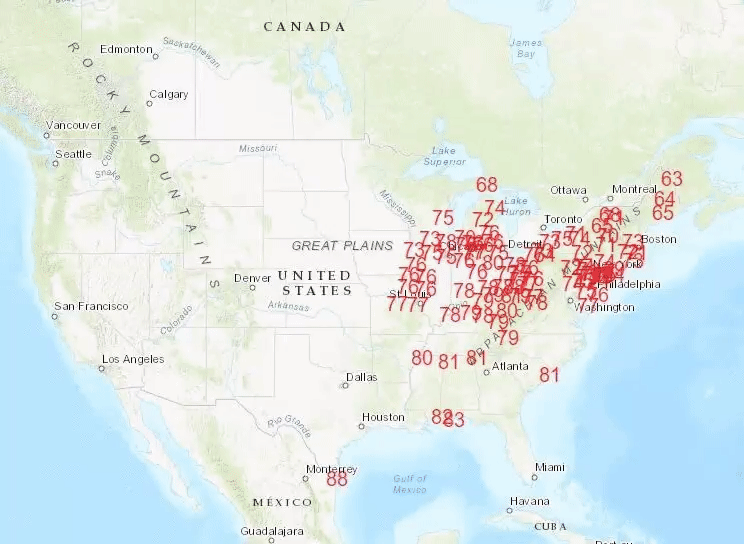Welcome to our third issue of end talk.
In light of the ambiguous state of the U.S. elections, we have a piece reflecting on the past week, and some takeaways from this strange moment. In addition, this installment brings you a climate roundup highlighting some alarming developments; a new music video from our project, Denmark; a look at the Electoral College; a recent podcast we recorded about Radiohead; as well as some music/media recommendations.
Round and round, in circles
This past week was distinctly surreal for reasons having nothing to do with politics, but of course, the gravity of the U.S. elections inevitably pulled everything else into their orbit. Before all the chaos and uncertainty of vote tallying and mail-in ballots was under way, I couldn’t help coming back to the cyclical nature of things. This moment we find ourselves in is genuinely unprecedented, but the rhetoric around politics, this election, and all that branches out from them feels very much recycled.
We discussed this phenomenon in our most recent podcast; many of the dynamics from 2016 feel just slightly repackaged today, including this apparent victory that Biden/Harris have for themselves. At the heart of both of the 2020 presidential campaigns is a promise to return to a mythical past; for Trump, it’s continuing MAGA and the policies of his first term, and for Biden, it’s falling back to the Obama years, with a vague sense of “hope” and “decency.” We seem fated to engage in the same old arguments, the same strategic bickering, as well as getting off on the same impotent partisan ridicule, all in service of a political theater that skirts the surface of the crises happening now. This process doesn’t allow for anything new or inspired, despite the increasingly desperate need for it.
So much feels stuck because there’s no past to return to.
And then to future musings, it’s questions of who will be drafted to run next, what will fascism look like in the next four years, what kind of dystopia will we find ourselves in then, etc. We pay lip service to these things to seem “serious,” while continually pushing away what’s staring us in the face. And I understand why, because it’s terrifying and overwhelming to look. But that kind of evasion or denial will only further intensify these cycles.
It all creates this maddening feeling, like being stuck in a revolving door. So we’ll keep going round and round.
[Climate Roundup]
Daily CO2 (recorded Nov 9, 2020 in Mauna Loa, Hawaii): 412.06 ppm


Earlier this month, a storm front swept across the Great Plains of the United States, plowing up a wall of dust that could be seen from space, stretching from eastern Colorado into Nebraska and Kansas. It was a scene straight from the Dust Bowl of the 1930s, when farmers regularly saw soil stripped from their fields and whipped up into choking blizzards of dust.
Better get used to it. According to a new study, dust storms on the Great Plains have become more common and more intense in the past 20 years, because of more frequent droughts in the region and an expansion of croplands. “Our results suggest a tipping point is approaching, where the conditions of the 1930s could return,” says Gannet Haller, an atmospheric scientist at the University of Utah who led the study.
A Troubling Discovery in the Arctic
Three years ago, the U.S. Geological Survey labeled Arctic hydrates as one of the world’s four most serious causation events of abrupt climate change. Yet, according to USGS geophysicist Carolyn Ruppel, who oversees the USGS Gas Hydrates Project: “After so many years spent determining where gas hydrates are breaking down and measuring methane flux at the sea-air interface, we suggest that conclusive evidence for release of hydrate-related methane to the atmosphere is lacking.” (Gas Hydrate Breakdown Unlikely to Cause Massive Greenhouse Gas Release, US Geological Survey, Feb. 9, 2017)
According to USGS calculations, sediments in the Arctic contain a huge quantity of frozen methane and other gases – known as hydrates. Along those lines, it’s important to note that methane (CH4) has a warming effect 80 times stronger than carbon dioxide over its initial 20 years. Meaning CH4 has a sharper, quicker impact on global warming than does CO2.


Those of you who know us will know we have a musical project called Denmark. This has been an on-and-off project for almost the last seven(!) years. We’ve released six properly recorded songs—most recently, simultaneously, Everything Is Alright and The Runaround.
Everything Is Alright dates back for me (Will) almost ten years—it began as the brief piano riff that opens and closes the song. The Runaround was (ultimately, after much arranging by Greg) the result of a jam we had sometime in 2018…
Over the last couple of weeks we put together a video for Everything Is Alright, with clips largely compiled from the last five years. Watch below:
Listen here and here // follow here.
Count on the National Popular Vote, Not the Electoral College
About a month ago, we recorded a conversation about Radiohead, using the 20-year anniversary of the release of Kid A as a jumping off point. We talked about doing this for a while, long before we started putting podcasts together. Our conversation spreads outwardly from Radiohead to indie music generally—its trajectory in the last two decades—and how culture and politics locked together with them in that time. It’s a subject that feels very vital to us, so check it out:
Leonard Cohen, 9/21/1934—11/7/2016
Watch all 17 minutes of this:
Thanks for reading. If you like what we’re doing, please subscribe and connect (@endtalkpod)!






